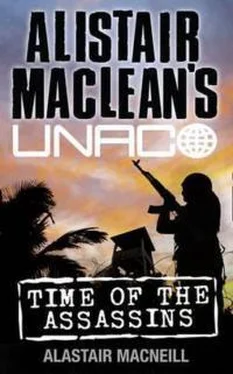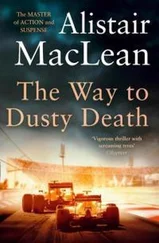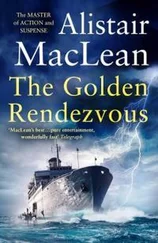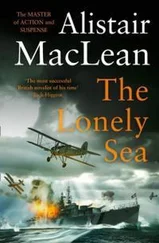One of the workmen broke away from the group and approached him. Sibele knew him only as Johnny.
His real name was Thomas Massenga, once Ngune’s right-hand man, who had been on the run since Jamel Mobuto came to power. It was only when he got closer that Sibele saw the blood on the sleeve of his blue overall. Massenga pulled a Mini-Uzi from inside his overall and shot Sibele at point-blank range.
The bulldozer which had stood dormant for the past two days coughed into life and rumbled towards the prison gates. Two guards, who had been alerted by the gunfire, ran towards the gates. Both were armed with FN FAL semi-automatic rifles. Massenga shot them before they could fire at the bulldozer. It smashed through the gates, tearing them off their hinges as though they were made of plastic. Massenga gestured to the other six men who immediately followed him into the prison compound, each carrying a Mini-Uzi.
The skeleton staff were no match for Massenga and his team of ex-Security policemen. The fighting was over within a minute and they were able to make their way down to the cells. The two guards outside Ngune’s cell threw down their weapons when challenged by Massenga. They had no option. Massenga took the keys from one of them and unlocked Ngune’s cell door. He hurried over to where Ngune lay and crouched anxiously beside him, horrified at the sight of Ngune’s discoloured, swollen face.
Immediately he ordered two of his men to carry Ngune then locked the two terrified guards in an adjoining cell. Discarding the keys, he then led the way back to the front of the prison. He glanced at his watch. They had made good time. Although the telephone wires had been cut minutes before the assault he knew the authorities would still have been alerted and were almost certainly on their way to the prison at that very moment.
A black van reversed through the shattered remains of the main gate and the back doors were thrown open. Ngune was helped into the back of the van and placed gently on a palliasse with his head resting on a pillow. Massenga closed the doors then climbed into the cab beside the driver who engaged the gears and pulled out into the road.
The plan was to change vehicles on the outskirts of Habane then continue on to Kondese where hundreds of men, mostly ex-Security policemen loyal to Ngune, were waiting to launch a crushing offensive against Jamel Mobuto’s inept, and disorganized, government troops, many of whom had only joined up when the new regime was instated. And with a team of assassins awaiting Jamel Mobuto’s arrival in America, it would only be a question of days before Tito Ngune was inaugurated as the new President of Zimbala.
It was a plan that couldn’t fail.
The New York Police Department, which was responsible for security at John F. Kennedy Airport, had drafted in fifty men for the arrival of Jamel Mobuto’s delegation in America. Fifteen snipers, each with M16 rifles (and infra-red night scopes), were positioned at strategic points overlooking the runway while another fifteen, in plainclothes, mingled freely with the crowds inside the terminal building itself. A section of runway had been cordoned off that afternoon by the remaining twenty policemen who had strict orders not to allow anyone through without an official pass. The authorities were determined not to take any chances, not with so much at stake. Whitlock had driven to the airport a couple of hours before the delegation was due to arrive to ensure that all the security measures had been put into operation. He had been satisfied with the arrangements. He glanced at his watch. The two hours were almost up and, according to air-traffic control, the presidential plane would land on schedule.
He looked around. To his left were three NYPD police cars, parked bumper to bumper, and behind them a human chain of police officers, all armed with handguns and rifles. To his right were the four black limousines that would be used to transport the Zimbalan delegation around New York. The opaque dark windows, like the chassis, were bulletproof, and each of the drivers could activate a row of razor-sharp spikes secreted on the undercarriage if any attempt was made to overturn the car. Every eventuality had to be covered.
The official welcoming party had congregated in front of the limousines, talking amongst themselves. The Zimbalan mission was headed by their newly appointed ambassador to the UN and the White House’s Chief of Protocol was the official representative from the American administration.
Whitlock’s eyes flickered to the two sombre-suited men standing apart from the others, Paul Brett and Jack Rogers. Bailey’s men. Both had been presidential bodyguards with the Reagan administration but neither of them had ever had to draw his gun in anger. Whitlock had spent most of the afternoon with them and he’d come away with the distinct impression that they held him in little regard. Although they never said it, he knew their bitterness stemmed from the fact that he would be in charge of the operation. They would be taking orders from someone outside the CIA.
Brett suddenly glanced across at him. His face remained expressionless. Rogers said something and they both laughed. Whitlock stared back at Brett. The hell he’d be intimidated by one of Bailey’s flunkeys. Brett looked away.
Whitlock suddenly noticed that a member of the Zimbalan mission had been watching them. She was an attractive, light-skinned African in her late twenties in a blue suit and white blouse. The translator. The official languages of Zimbala were Swahili and French; and several of the Zimbalan delegates didn’t speak English. He smiled at her. She smiled back then looked away quickly as if she had been caught doing something wrong. He suddenly thought of Rosie. He’d been so busy that afternoon that he’d completely forgotten to call her. He felt a sense of guilt but at the same time knew he could never have spoken to her anyway. He made a mental note to call her and arrange a time to meet, away from her parents.
Someone called out, breaking his train of thought. The presidential plane was making its final descent. He immediately ordered the policemen to take up their designated positions on the runway then crossed to where Brett and Rogers were standing. They glanced at him but said nothing.
The white Gulfstream One executed a perfect landing but it was only when it taxied towards them that Whitlock saw the blue, red and white Zimbalan flag painted on the side of the fuselage with the words ‘Air Zimbala’ above it in black lettering. It was obvious that the plane had been repainted before its journey and Whitlock suddenly wondered if it had been done to erase the memories of the previous regime. He let the thought pass as the plane came to a halt less than twenty yards away from the limousines. The hatch opened and a set of steps was driven up to it. The Chief of Protocol led the way to the foot of the steps, waiting for Mobuto to appear. The first man to emerge had to duck through the opening. Whitlock judged him to be at least six foot six. He looked around him slowly then disappeared back inside the aircraft. He reappeared a moment later and Whitlock immediately recognized Mobuto when he emerged behind the bodyguard. He was a tall, handsome man who had an air of confidence about him. He was dressed in an expensive grey Dior suit and wore dark glasses. It was hard to believe he was forty-two years old. He looked ten years younger.
He removed the glasses on reaching the tarmac and he shook the Chief of Protocol’s extended hand.
Rogers and Brett immediately flanked him at the foot of the steps and walked with him as he shook hands with each member of the Zimbalan mission in turn. His grip lingered on the translator’s hand and he smiled faintly at her before turning back to the Chief of Protocol who was standing behind him. It was then that he noticed Whitlock standing discreetly in the background. He told Brett and Rogers to hold back then crossed to where Whitlock stood and held out a hand of greeting.
Читать дальше












